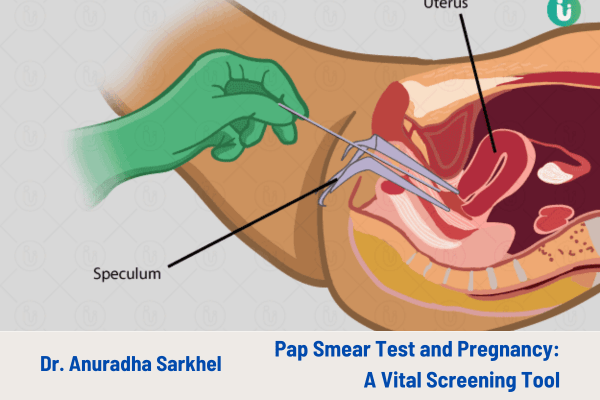Pregnancy is a time filled with excitement and anticipation, but it also brings the responsibility of maintaining optimal health for both the mother and the developing baby. As part of prenatal care, a Pap smear test may be recommended during pregnancy. In this blog, Dr. Anuradha Sarkhel, one of the best gynecologist, will explain the significance of Pap smear tests during pregnancy. Let’s delve into the relevance of this screening procedure, its connection to cervical health, and how it contributes to ensuring a safe and healthy pregnancy journey.
Understanding the Pap Smear Test:
A Pap smear, also known as a Pap test or cervical cytology, is a simple procedure performed to collect cells from the cervix (the lower part of the uterus) for examination. These cells are then analyzed in a laboratory to screen for any abnormal changes that may indicate the presence of cervical abnormalities, including precancerous or cancerous conditions.
Importance of Pap Smear Tests During Pregnancy:
Detecting Cervical Abnormalities: One of the primary reasons for performing a Pap smear test during pregnancy is to identify any abnormal changes in the cervical cells. Detecting these abnormalities early on is crucial as it allows for timely intervention and treatment, minimizing the risk of complications.
Monitoring Cervical Health: Pap smear tests provide valuable information about the overall health of the cervix. Regular screening helps track any changes in the cervical cells and allows healthcare providers to assess the need for further evaluation or treatment.
Assessing Human Papillomavirus (HPV) Infection: Pap smear tests also help identify the presence of the human papillomavirus (HPV), a common sexually transmitted infection known to cause cervical abnormalities. By detecting HPV infection, appropriate management and follow-up can be initiated during pregnancy.
Preventing Cervical Cancer: Cervical cancer is a significant concern for women, and Pap smear tests play a pivotal role in its prevention. Regular screening helps identify precancerous changes in the cervical cells, allowing for early treatment and reducing the risk of developing cervical cancer.
Ensuring a Safe Pregnancy: By monitoring cervical health, Pap smear tests contribute to ensuring a safe pregnancy. Certain cervical conditions, such as an incompetent cervix (weakening of the cervix), can increase the risk of preterm labor and delivery. Early detection through Pap smear tests enables healthcare providers to provide appropriate interventions and support.
When to Have a Pap Smear Test During Pregnancy:
Pap smear tests are typically conducted during routine prenatal visits. However, the timing may vary depending on various factors, including your medical history, previous Pap smear results, and healthcare provider’s recommendations. It is essential to discuss the optimal timing of Pap smear tests with your healthcare provider.
Conclusion:
Pap smear tests are a vital component of prenatal care, ensuring the optimal health and well-being of both the expectant mother and the baby. By detecting cervical abnormalities, assessing HPV infection, and preventing cervical cancer, Pap smear tests play a significant role in safeguarding maternal health during pregnancy. If you’re pregnant or planning to conceive, consult with top gynecologist in Kolkata like Dr. Anuradha Sarkhel to understand the importance of Pap smear tests in your specific situation. Regular screenings can contribute to a safe and healthy pregnancy journey.

